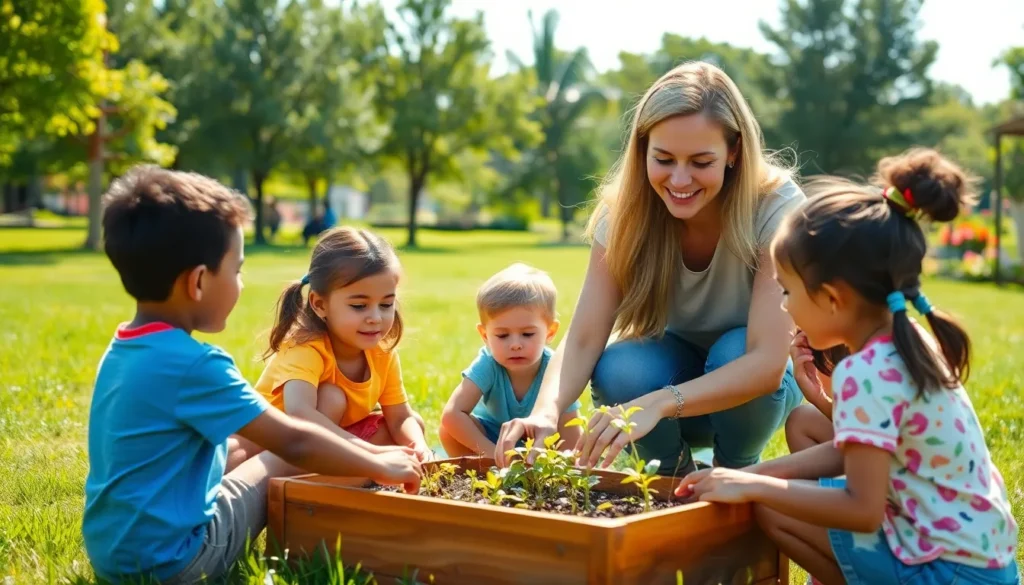Table of Contents
ToggleIn a world where plastic seems to outnumber people, eco-conscious parenting is like a superhero cape for modern parents. It’s not just about saving the planet; it’s about raising little eco-warriors who’ll grow up to appreciate nature and maybe even save us from impending doom. Who wouldn’t want to trade in diaper waste for a greener future?
Understanding Eco-Conscious Parenting
Eco-conscious parenting represents a commitment to raising children with a strong awareness of environmental issues. This approach nurtures a sense of responsibility toward nature and promotes sustainable living practices.
Definition and Key Principles
Eco-conscious parenting involves several core principles. Prioritizing sustainability, families adopt eco-friendly practices in daily life. Minimizing waste becomes essential, leading to the use of reusable products and mindful consumption. Education plays a vital role, helping children learn the importance of biodiversity and conservation. Engaging in outdoor activities fosters a connection to nature, enhancing appreciation for the environment. Supporting local and organic products contributes to healthier lifestyles and reduces carbon footprints.
Benefits for the Environment and Family
Numerous benefits stem from eco-conscious parenting. Reducing plastic and waste significantly lessens environmental impact. Families often experience improved health through natural food choices, which can lead to better physical well-being. Children gain valuable life skills, such as gardening and recycling, laying the foundation for lifelong habits. Cultivating a sense of community occurs as families connect with others sharing similar values. Lastly, fostering a love for nature encourages future generations to protect the environment, ensuring a sustainable planet.
Sustainable Practices in Parenting

Embracing sustainable practices plays a crucial role in eco-conscious parenting. Parents can make informed choices by incorporating environmentally friendly products and methods into daily routines.
Eco-Friendly Baby Products
Choosing eco-friendly baby products minimizes exposure to harmful chemicals and reduces environmental impact. Parents can select organic cotton clothing, biodegradable diapers, and natural skincare items. These alternatives prioritize health and sustainability, ensuring a safer environment for the child. When possible, opting for second-hand items supports a zero-waste lifestyle, while durable products offer longevity. Families can also explore brands committed to ethical manufacturing practices, reinforcing their dedication to sustainability.
Green Cleaning Solutions for Homes
Adopting green cleaning solutions promotes a healthier home environment. Parents can replace conventional cleaners with natural alternatives like vinegar, baking soda, and essential oils. These products effectively clean without introducing harsh chemicals. Making cleaning supplies at home allows customization while reducing packaging waste. Families can cultivate a safe atmosphere for children by using non-toxic cleaning options. Supporting brands with eco-friendly commitments further amplifies the positive impact on the planet.
Nutrition and Eco-Conscious Choices
Nutrition plays a vital role in eco-conscious parenting, impacting not only family health but also the environment. Making informed choices can foster a sustainable lifestyle for children.
Organic and Locally Sourced Foods
Choosing organic and locally sourced foods benefits both health and the environment. Organic foods contain fewer pesticides and synthetic fertilizers, fostering healthier ecosystems. Supporting local farmers shortens transportation distances, reducing carbon footprints significantly. Incorporating seasonal produce enhances nutrition while connecting children to their local landscape. By visiting farmers’ markets, families cultivate relationships with growers and encourage a sense of community. Prioritizing these foods instills values of sustainability, teaching children the importance of making mindful choices.
Waste Reduction in Meal Preparation
Reducing waste during meal preparation encourages sustainability in the kitchen. Planning meals ahead of time prevents over-purchasing and promotes the use of existing ingredients. Utilizing leftovers creatively minimizes waste and inspires resourcefulness. Choosing bulk items reduces packaging waste, while glass containers and reusable bags foster eco-friendly practices. Furthermore, composting food scraps enriches soil and minimizes landfill contributions. Engaging children in these practices cultivates their understanding of food cycles, reinforcing their role in protecting the environment.
Raising Awareness and Involvement
Engaging children in eco-conscious practices fosters a sense of responsibility toward the environment. Awareness emphasizes the importance of sustainability and community involvement.
Teaching Kids About Sustainability
Parents commonly introduce sustainability through hands-on experiences. Gardening offers a practical way for children to learn about plants, food sources, and ecosystems. Field trips to local farms educate children about where food comes from while reinforcing connections to nature. Encouraging discussions about conservation helps children recognize the impact of their choices. Craft projects using recycled materials spark creativity and resourcefulness while demonstrating waste reduction. Parents can also read age-appropriate books about the environment, making learning fun and accessible.
Community Engagement and Activism
Involvement at the community level promotes a collective commitment to sustainability. Families can participate in local clean-up events, fostering teamwork and awareness of litter’s effects on surroundings. Joining community gardens enables social connections and offers hands-on experience in sustainable practices. Parents often explore collaborative initiatives, like tree planting days to enhance local green spaces. Educational workshops provide opportunities to learn about environmental issues and solutions directly from experts. Strong community involvement reinforces shared values and encourages a broader impact in the fight for a healthier planet.
Embracing eco-conscious parenting is a powerful way to shape a sustainable future. By instilling values of environmental responsibility and appreciation for nature in children, parents can help cultivate a generation that prioritizes the planet.
Through mindful choices in daily routines and engaging activities, families can significantly reduce their ecological footprint while promoting healthier lifestyles.
The journey of eco-conscious parenting not only benefits the environment but also strengthens family bonds and fosters a sense of community. As families unite in their commitment to sustainability, they pave the way for a brighter and greener world for generations to come.







